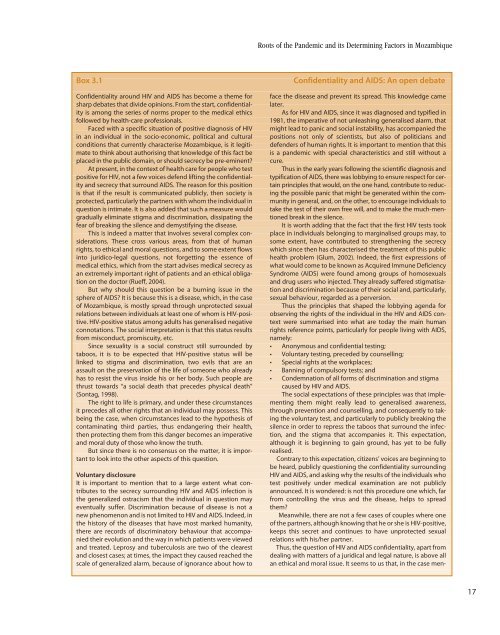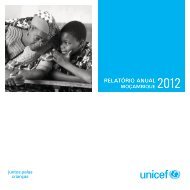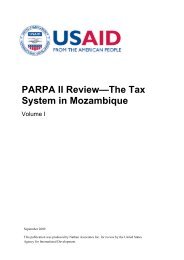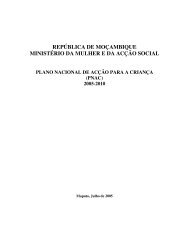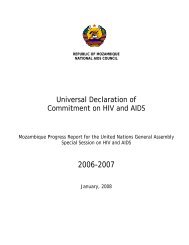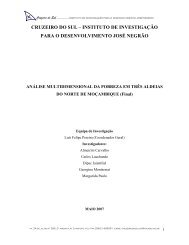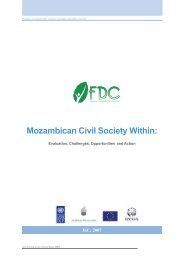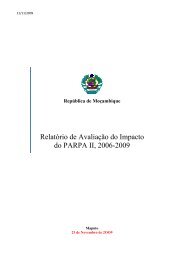English language version - Human Development Reports - United ...
English language version - Human Development Reports - United ...
English language version - Human Development Reports - United ...
- No tags were found...
You also want an ePaper? Increase the reach of your titles
YUMPU automatically turns print PDFs into web optimized ePapers that Google loves.
Roots of the Pandemic and its Determining Factors in MozambiqueBox 3.1Confidentiality around HIV and AIDS has become a theme forsharp debates that divide opinions. From the start, confidentialityis among the series of norms proper to the medical ethicsfollowed by health-care professionals.Faced with a specific situation of positive diagnosis of HIVin an individual in the socio-economic, political and culturalconditions that currently characterise Mozambique, is it legitimateto think about authorising that knowledge of this fact beplaced in the public domain, or should secrecy be pre-eminent?At present, in the context of health care for people who testpositive for HIV, not a few voices defend lifting the confidentialityand secrecy that surround AIDS. The reason for this positionis that if the result is communicated publicly, then society isprotected, particularly the partners with whom the individual inquestion is intimate. It is also added that such a measure wouldgradually eliminate stigma and discrimination, dissipating thefear of breaking the silence and demystifying the disease.This is indeed a matter that involves several complex considerations.These cross various areas, from that of humanrights, to ethical and moral questions, and to some extent flowsinto juridico-legal questions, not forgetting the essence ofmedical ethics, which from the start advises medical secrecy asan extremely important right of patients and an ethical obligationon the doctor (Rueff, 2004).But why should this question be a burning issue in thesphere of AIDS? It is because this is a disease, which, in the caseof Mozambique, is mostly spread through unprotected sexualrelations between individuals at least one of whom is HIV-positive.HIV-positive status among adults has generalised negativeconnotations. The social interpretation is that this status resultsfrom misconduct, promiscuity, etc.Since sexuality is a social construct still surrounded bytaboos, it is to be expected that HIV-positive status will belinked to stigma and discrimination, two evils that are anassault on the preservation of the life of someone who alreadyhas to resist the virus inside his or her body. Such people arethrust towards “a social death that precedes physical death”(Sontag, 1998).The right to life is primary, and under these circumstancesit precedes all other rights that an individual may possess. Thisbeing the case, when circumstances lead to the hypothesis ofcontaminating third parties, thus endangering their health,then protecting them from this danger becomes an imperativeand moral duty of those who know the truth.But since there is no consensus on the matter, it is importantto look into the other aspects of this question.Voluntary disclosureIt is important to mention that to a large extent what contributesto the secrecy surrounding HIV and AIDS infection isthe generalized ostracism that the individual in question mayeventually suffer. Discrimination because of disease is not anew phenomenon and is not limited to HIV and AIDS. Indeed, inthe history of the diseases that have most marked humanity,there are records of discriminatory behaviour that accompaniedtheir evolution and the way in which patients were viewedand treated. Leprosy and tuberculosis are two of the clearestand closest cases; at times, the impact they caused reached thescale of generalized alarm, because of ignorance about how toConfidentiality and AIDS: An open debateface the disease and prevent its spread. This knowledge camelater.As for HIV and AIDS, since it was diagnosed and typified in1981, the imperative of not unleashing generalised alarm, thatmight lead to panic and social instability, has accompanied thepositions not only of scientists, but also of politicians anddefenders of human rights. It is important to mention that thisis a pandemic with special characteristics and still without acure.Thus in the early years following the scientific diagnosis andtypification of AIDS, there was lobbying to ensure respect for certainprinciples that would, on the one hand, contribute to reducingthe possible panic that might be generated within the communityin general, and, on the other, to encourage individuals totake the test of their own free will, and to make the much-mentionedbreak in the silence.It is worth adding that the fact that the first HIV tests tookplace in individuals belonging to marginalised groups may, tosome extent, have contributed to strengthening the secrecywhich since then has characterised the treatment of this publichealth problem (Glum, 2002). Indeed, the first expressions ofwhat would come to be known as Acquired Immune DeficiencySyndrome (AIDS) were found among groups of homosexualsand drug users who injected. They already suffered stigmatisationand discrimination because of their social and, particularly,sexual behaviour, regarded as a per<strong>version</strong>.Thus the principles that shaped the lobbying agenda forobserving the rights of the individual in the HIV and AIDS contextwere summarised into what are today the main humanrights reference points, particularly for people living with AIDS,namely:• Anonymous and confidential testing;• Voluntary testing, preceded by counselling;• Special rights at the workplaces;• Banning of compulsory tests; and• Condemnation of all forms of discrimination and stigmacaused by HIV and AIDS.The social expectations of these principles was that implementingthem might really lead to generalised awareness,through prevention and counselling, and consequently to takingthe voluntary test, and particularly to publicly breaking thesilence in order to repress the taboos that surround the infection,and the stigma that accompanies it. This expectation,although it is beginning to gain ground, has yet to be fullyrealised.Contrary to this expectation, citizens’ voices are beginning tobe heard, publicly questioning the confidentiality surroundingHIV and AIDS, and asking why the results of the individuals whotest positively under medical examination are not publiclyannounced. It is wondered: is not this procedure one which, farfrom controlling the virus and the disease, helps to spreadthem?Meanwhile, there are not a few cases of couples where oneof the partners, although knowing that he or she is HIV-positive,keeps this secret and continues to have unprotected sexualrelations with his/her partner.Thus, the question of HIV and AIDS confidentiality, apart fromdealing with matters of a juridical and legal nature, is above allan ethical and moral issue. It seems to us that, in the case men-17


